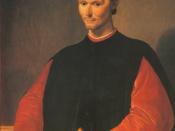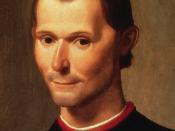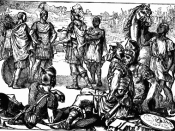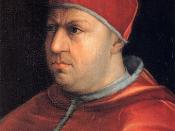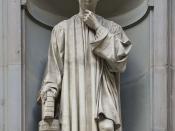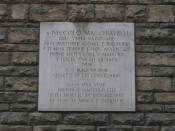Niccolo di Bernardo dei Machiavelli was an Italian diplomat, a political philosopher, a musician, and a poet. He was born in a village near the city-state of Florence, Italy, in 1469. Machiavelli is best considered as one of the great early analyzers of political power. He is best remembered for his masterpiece, The Prince. The Prince stands apart from all other political writings of the period as it focuses on the practical problems a monarch faces in staying in power. Machiavelli is really important because he introduced the concept of realism, practical down-to-earth considerations, into a previously exalted or "transcendental" subject. Furthermore, The Prince was one of the first humanist works of the Renaissance and was very secular. In it, Machiavelli proposes that religion and politics should be separate, which was a very new idea for the people to accept easily. The main themes discussed in The Prince are Defense and Military, Cruelty vs.
Mercy, and Generosity vs. Frugality.
The basic point of view of the book is that in order to succeed, a prince should ignore moral considerations entirely and depend upon strength and cunning. Machiavelli stressed heavily on the importance of a state being well armed. He stood strongly against mercenaries because they were useless and dangerous for the country. He believed that their only motivation to fight is for money. According to him, a prince that relies solely on fortifications or on the help of others and stands on the defensive is not self-sufficient. A prince who is diligent in times of peace is going to be ready in times of adversity. Italy was in a bit of a turmoil in the 16th century and it didn't have a very good military and defense force. Italy also hired mercenaries and that was Machiavelli's straight target: to get rid of them.
In chapter XVII, Machiavelli writes, "â¦it is much safer to be feared than loved, when, of the two, either must be dispensed with." His explanation for this was that commitments made in peace are not always kept, and commitments made in fear are kept out of fear. But, a prince must ensure that he is not feared to the point of hatred which could be dangerous to his position. Above all, Machiavelli argues, do not interfere with the property of the subjects, their women, or the life of somebody without proper justification. Regarding the troops of the prince, fear is absolutely necessary to keep a large post united and a prince should not mind the thought of cruelty in that regard. For a prince who leads his own army, it is crucial for him to observe cruelty because that is the only way he can command his soldiers' absolute respect. Machiavelli compares two great military leaders: Hannibal and Scipio. Although Hannibal's army consisted of men of various races, they were never rebellious because they feared their leader. Scipio's men, on the other hand, were known for their mutiny and dissension.
If a prince is overly generous to his subjects, Machiavelli states that they will lose appreciation and will only greed for more. Additionally, being over-generous is not economical, because it might result in exhaustion of all resources, which would result in higher taxes and thus the people will rebel. Moreover, if a prince decides to label his generosity on the people, he will be labeled as a miser. As a result, Machiavelli summarizes that guarding against the people's hatred is more important than building up reputation for generosity. A wise prince should be more willing to be reputed a miser than be hated for trying to be too generous.
Machiavelli played an important role in the political aspect of the Renaissance in Italy. He explained to the reader the best acquire, maintain, and protect a state.The Prince became the most famous political writing of this period. During this era, Italy was divided into four city-states and had a very weak government. As it was mentioned before, it didn't have a very good defense and military force either. The Prince was written at a time when the country was in a political upheaval and it was written as a guide to the upcoming rulers on how to stabilize Italy, and how to gain and keep power. Since 1434, the wealthy Medici family ruled Florence. A reform movement, begun in 1494, temporarily interrupted their rule, in which the young Machiavelli became an important diplomat. When the Medici family regained power in 1512 with the help of Spanish troops, Machiavelli was tortured and removed from public life because he was suspected of participating in a conspiracy against the new rulers. He then devoted himself to writing history, political philosophy, and even plays. After 10 years of writing, he received and gained favor with the Medici family and was called back to office the last two years of his life. Niccolo Machiavelli died in June of the year 1527.
Sources:1) "Machiavelli." Philosophy Pages. 29 Mar. 2008 .
2) "Niccolo Machiavelli." Connecticut Business Web and Cyber Shopping Mall- web page creation and hosting, advertising, home pages, internet publishing. 29 Mar. 2008 .
